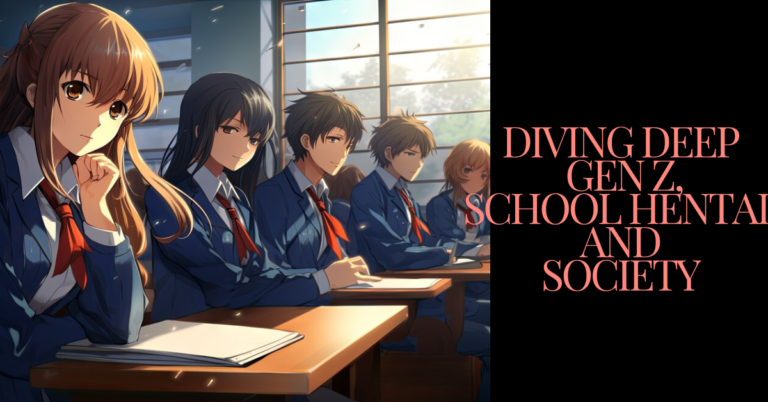The topic of school hentai and its potential impact on Generation Z (Gen Z) and society at large is a complex and multifaceted issue that requires a thorough analysis. School hentai refers to a genre of explicit adult-oriented content, often depicted in manga, anime, or written works, that revolves around sexual or erotic scenarios set within a school environment. In this in-depth analysis, we will explore the arguments for and against the consumption of school hentai by Gen Z individuals, as well as its broader implications for societal attitudes towards sexuality, relationships, and media consumption.
Understanding School Hentai:
Before delving into the analysis, it’s crucial to have a clear understanding of what school hentai entails. School hentai typically involves depictions of sexual encounters, fantasies, and relationships among characters within a school setting. These scenarios may include student-teacher relationships, romantic encounters between classmates, or other taboo themes commonly associated with adolescent or educational contexts.
The Appeal of School Hentai to Generation Z:
- Curiosity and Exploration: Gen Z is a generation known for its curiosity and willingness to explore diverse content. School hentai, with its taboo themes and fantasy scenarios, may attract individuals seeking new experiences and narratives that push the boundaries of conventional storytelling.
- Digital Accessibility: The digital age has made explicit content, including hentai, easily accessible to Gen Z individuals through online platforms, streaming services, and social media. The anonymity and convenience of online spaces contribute to the accessibility and popularity of school hentai among this demographic.
- Fantasy and Escapism: School hentai often presents idealized and fantastical scenarios that serve as a form of escapism for individuals navigating the complexities of adolescence and young adulthood. The exaggerated character designs, romanticized relationships, and imaginative settings offer a temporary escape from reality.
- Peer Influence and Pop Culture: Peer influence and exposure to popular culture, including anime and manga, play a significant role in shaping Gen Z’s interests and preferences. The normalization and acceptance of hentai within certain online communities and fan cultures may contribute to its appeal among young adults.
Arguments For School Hentai Consumption:
- Freedom of Expression: Supporters of hentai argue for the freedom of artistic expression and creativity in media. They view hentai as a form of adult-oriented entertainment that caters to diverse interests and fantasies, highlighting the importance of respecting individual preferences and choices in media consumption.
- Exploration of Themes: School hentai may explore complex themes related to sexuality, identity, desire, and human relationships. Some argue that it provides a platform for nuanced storytelling and introspection, addressing topics that may be challenging or taboo in mainstream media.
- Artistic and Creative Merit: Proponents of hentai often cite its artistic and creative merits, including character design, narrative structure, and visual storytelling techniques. They emphasize the distinction between hentai as a form of fictional entertainment and real-world attitudes towards sexuality and relationships.
Arguments Against School Hentai Consumption:
- Distorted Perceptions: Critics of hentai express concerns about its potential to distort perceptions of healthy relationships, consent, and sexual behavior, particularly among younger audiences. The idealized and exaggerated portrayals of romance and intimacy in hentai may create unrealistic expectations or normalize problematic dynamics.
- Objectification and Fetishization: School hentai, like other forms of adult-oriented content, has been criticized for objectifying characters, perpetuating harmful stereotypes, and fetishizing certain aspects of sexuality. The sexualization of underage characters or non-consensual scenarios raises ethical and legal concerns.
- Impact on Mental Health: Excessive consumption of explicit content, including hentai, has been linked to negative impacts on mental health, such as body image issues, self-esteem concerns, and distorted perceptions of intimacy. The hypersexualized nature of hentai can contribute to unrealistic beauty standards and sexualized portrayals of youth.
- Ethical and Legal Considerations: The depiction of underage characters or non-consensual scenarios in school hentai raises ethical and legal questions regarding child exploitation, consent, and responsible media production. Critics advocate for responsible content regulation, age-appropriate access controls, and ethical production standards within the adult entertainment industry.
Impact on Society:
- Cultural Attitudes towards Sexuality: The consumption of school hentai reflects broader cultural attitudes towards sexuality, consent, gender roles, and power dynamics. It can shape societal norms and values regarding sexual expression, intimacy, and relationships, influencing how individuals perceive and navigate these aspects of life.
- Media Regulation and Ethics: The availability and distribution of explicit content, including hentai, raise questions about media regulation, ethical production standards, and responsible consumption. Societal debates often revolve around balancing freedom of expression with ethical considerations and protection of vulnerable populations, such as minors.
- Sexual Education and Awareness: The impact of hentai consumption on sexual education and awareness is a topic of discussion. Advocates emphasize the importance of comprehensive sexual education, consent education, and media literacy to equip individuals with critical thinking skills and ethical decision-making frameworks.
- Social Discourse and Stigma: The stigma and taboo surrounding adult-oriented content, including hentai, can lead to social discourse, censorship debates, and cultural clashes. Open dialogue, education, and destigmatization efforts are essential in fostering understanding, addressing misconceptions, and promoting healthy attitudes towards sexuality and media consumption.
Conclusion:
The discussion surrounding school hentai and its impact on Gen Z and society is complex and multifaceted, encompassing diverse perspectives, ethical considerations, and societal implications. While some argue for the freedom of artistic expression, exploration of themes, and individual choice in media consumption, others raise concerns about distorted perceptions, objectification, and ethical standards.
Ultimately, addressing the impact of school hentai requires a nuanced approach that balances freedom of expression with ethical considerations, promotes media literacy and critical thinking skills, fosters open dialogue and education about healthy relationships and sexuality, and advocates for responsible content regulation and production standards within the adult entertainment industry. As Gen Z continues to navigate the digital landscape and engage with diverse forms of media, including explicit content, ongoing discussions and initiatives are needed to promote ethical, informed, and respectful media consumption practices.

